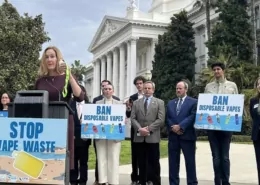Banning Flavored Vapes Leads to More Smoking, New Study Confirms
Exciting new research reveals that prohibiting flavored vape products erroneously causes increased traditional cigarette consumption. The findings demonstrate how well-intentioned but flawed vaping flavor restrictions end up protecting deadly combustible cigarettes.
Background on the Study
Researchers from institutions including Yale, Georgetown and the University of Missouri recently published a working paper examining the unintended public health impacts of flavor bans. The FDA and NIH funded the important study.
The authors first built an extensive database cataloging every flavored vape prohibition enacted across the U.S. from 2018 to early 2023. This included analyzing the enactment and enforcement dates, product types covered, and location specifics for hundreds of state and local flavor restrictions.
Armed with this comprehensive flavor ban database, the researchers then cross-referenced it against equally massive retail sales data obtained from Information Resources Incorporated (IRI). This allowed them to directly track changes in vape and cigarette purchasing before and after various flavor prohibitions took effect.
By combining hard sales data with meticulously researched policy records, the study offers an authoritative window into how flavor restrictions alter consumer behavior over time. Now let’s dive into the alarming findings.
Key Takeaways of the Study
The researchers summarized several critical conclusions from their sales analysis:
- Cigarette sales clearly increased following flavor vape bans, while vape sales declined. This substitution effect strengthened the longer bans were in place.
- Non-menthol cigarettes accounted for 71% of the rise in smoking after bans. Simply banning menthol cigarettes does not prevent the unintended spike in smoking caused by prohibiting flavored vapes.
- Higher post-ban cigarette sales occurred across all brands, including those favored by youth. This indicates the flavor ban consequences extend beyond just adult consumers.
- Both total flavor bans and restrictive policies only allowing flavor vape sales in adult-only stores led to the same results – lower vaping rates coupled with more smoking.
- Prior studies also show vape taxes, costly premarket reviews, online sales limits, and age limit increases similarly boost cigarette consumption.
These findings confirm what health advocates have warned lawmakers about for years – restricting flavored vapes, however well-intentioned, inadvertently protects and promotes far deadlier cigarette smoking.
Vapes and Cigarettes Function as Economic Substitutes
The results of this sales impact study align with earlier research demonstrating vapes and cigarettes act as economic substitutes in the eyes of consumers. Any policies that disadvantage the sale of one product type will by extension advantage sales of the competing product.
By removing the diverse flavors that make vaping more satisfying and cigarette-like for adult switchers, flavor vape bans leave many consumers with only the much higher risk option of returning to deadly combustible cigarettes.
As the authors astutely conclude: “Policies making vapes more expensive, less accessible, or less appealing incentivize substitution towards cigarettes.”
These real-world substitutions measured in the study prove that policies aimed narrowly at limiting youth vaping – like flavor bans – end up doing far more harm than good by pushing adult consumers toward high-risk cigarette smoking. A more thoughtful regulatory balance is needed.
Achieving Balance Between Risks and Benefits
Reasonable restrictions that don’t entirely deprive adult smokers of access to appealing vaping alternatives represent a better regulatory path forward. Potential options include:
- Enforcing existing age verification laws without overzealous bans
- Increased retailer compliance enforcement and penalties
- Child-resistant packaging requirements
- E-liquid bottle labeling clearly indicating “for adult smokers only”
With care taken to avoid regulatory overreach, science shows vaping can provide massive public health dividends by offering smokers a dramatically less harmful alternative. Smokers deserve legal access to these lifesaving options. Concerned citizens must advocate for reforming flavor ban policies that backfire at the cost of human lives.
- Pakistan Halts Vape Crackdown Pending Legislation - July 4, 2025
- Wisconsin New Law Banning Sale of Most Vape Products - July 4, 2025
- Vaping Laws in Oklahoma: A Comprehensive Guide for 2025 - July 3, 2025








